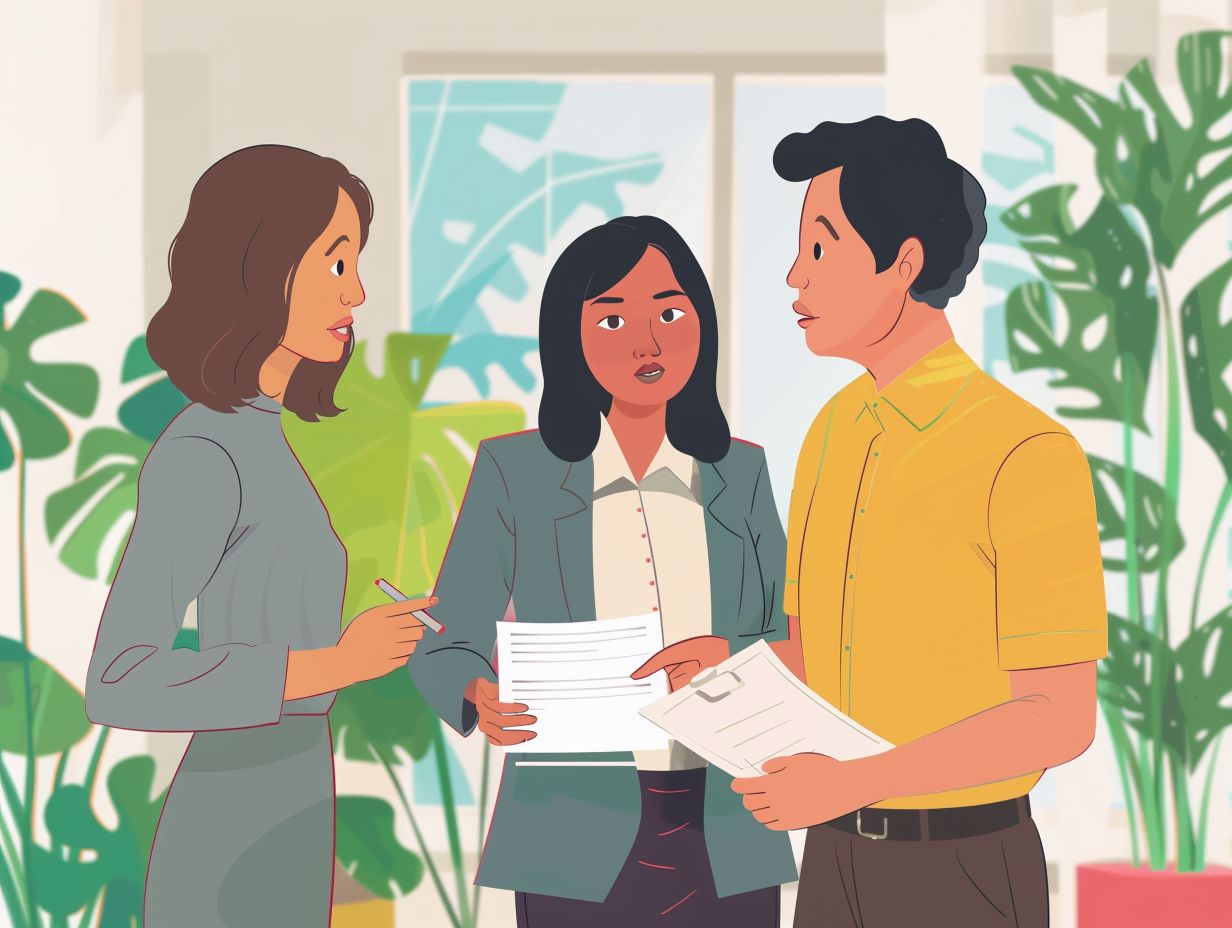Are you a landlord or tenant in Florida facing a dispute? Understanding your rights and responsibilities is crucial in navigating these challenging situations.
We will explore the most common types of disputes, including failure to maintain the property, security deposit issues, lease agreement violations, and the eviction process.
Learn about the steps you can take to resolve these disputes, such as communication, mediation, filing complaints, and seeking legal help.
Stay informed on how to handle landlord-tenant disputes in Florida effectively.
Key Takeaways:
- Communicate effectively with the other party to try and resolve the dispute before taking any legal action.
- If communication fails, seek mediation as a cost-effective and efficient way to resolve the dispute with the help of a neutral third party.
- If all else fails, be familiar with the necessary steps to file a complaint or lawsuit to protect your rights as a landlord or tenant in Florida.
Understanding Landlord-Tenant Disputes in Florida
Understanding landlord-tenant disputes in Florida is crucial for both parties in a rental agreement. These disputes frequently lead to legal action, court cases, and require a solid grasp of the rights and responsibilities detailed in the Florida Landlord/Tenant Law. Being aware of the typical disputes and the legal structure outlined in the Florida Statutes can assist landlords and tenants in managing their obligations and finding solutions efficiently.
What are the Most Common Types of Disputes?
The most frequent types of disputes between landlords and tenants typically involve matters such as nonpayment of rent, failure to maintain the property, disagreements over security deposits, and violations of the lease agreement.
1. Failure to Maintain the Property
Failure to maintain the property is a common source of contention between landlords and tenants, often resulting from the landlord’s noncompliance with local housing codes and maintenance obligations.
This lack of upkeep can lead to various issues such as mold growth, pest infestations, electrical hazards, and structural deterioration. Landlords have a legal responsibility to ensure that their properties meet certain health and safety standards outlined in housing codes.
These codes typically cover areas like sanitation, ventilation, plumbing, and fire safety. Regular inspections and necessary repairs are crucial to prevent violations and maintain a habitable living environment for tenants. Ignoring maintenance duties can not only strain the landlord-tenant relationship but also lead to legal consequences and financial liabilities for the property owner.
2. Security Deposit Disputes
Disagreements over security deposit deductions often occur between landlords and tenants at the end of a lease term.
These disputes can arise from various issues, including property damage beyond normal wear and tear, unpaid rent or utility bills, or cleaning expenses.
To prevent conflicts, it is crucial for both parties to understand the legal regulations related to security deposits. Landlords are usually obligated to furnish a detailed list of deductions and receipts within a specific timeline, while tenants are expected to comply with the terms of the lease agreement.
Effective communication and thorough documentation are vital in avoiding disputes, so maintaining a record of the property’s condition pre and post tenancy can be beneficial in resolving conflicts smoothly.
3. Lease Agreement Violations
Lease agreement violations occur when either the tenant or the landlord fails to adhere to the terms stipulated in the rental agreement, leading to potential legal disputes. These violations, ranging from late rental payments to unauthorized alterations to the property, can have serious consequences for both parties involved.
Tenants may face eviction, while landlords risk financial losses and potential damage to their property. Legal implications of such violations often involve court proceedings, fines, or the termination of the lease agreement.
To address these issues, communication and understanding between the tenant and landlord are key, along with adherence to the established guidelines set forth in the lease agreement to prevent future disputes.
4. Eviction Process
The eviction process in Florida is a legally complex procedure that landlords must follow to remove a tenant from a rental property. This process involves specific notices, court filings, and adherence to state eviction laws.
A critical step in the eviction process is issuing an eviction notice to the tenant. This notice usually includes the reason for eviction, a deadline for compliance or vacating the premises, and information on tenant rights.
In Florida, landlords are required by law to provide tenants with a written notice, commonly referred to as a ‘Notice to Quit’ or ‘Notice to Pay Rent or Quit’, before taking formal legal action. Landlords need to ensure that these notices are properly served and meet all legal requirements to prevent delays and potential challenges throughout the eviction process.
What are the Rights and Responsibilities of Landlords and Tenants in Florida?
Understanding the rights and responsibilities of landlords and tenants in Florida is important for maintaining a harmonious rental relationship and complying with the Florida Statutes that regulate rental agreements and housing laws.
1. Landlord’s Responsibilities
Landlords in Florida are required to keep their rental properties in line with local housing codes to ensure that the dwelling units are safe and fit for tenants.
This maintenance duty includes making sure that the property meets standards for structural integrity, sanitation, and safety features. Landlords must address any necessary repairs or issues that may arise during a tenant’s stay promptly to maintain the unit’s habitability.
Failing to meet these obligations can lead to legal consequences, like fines or possible lawsuits. By staying proactive in meeting these regulations and promptly handling maintenance issues, landlords can establish a positive and secure living environment for their tenants while also sidestepping potential legal disputes.
2. Tenant’s Responsibilities
Tenants in Florida are expected to fulfill various responsibilities, which include timely payment of rent, maintaining the property in good condition, and following the terms outlined in the lease agreement.
Failure to meet these obligations can result in significant repercussions, such as eviction proceedings, forfeiture of the security deposit, or being held accountable for damages that exceed normal wear and tear.
To mitigate such circumstances, tenants should promptly notify the landlord of any maintenance concerns, obtain consent before making changes to the property, and respect the rights of their fellow tenants. By adhering to these guidelines, tenants can promote a harmonious living environment and cultivate a positive relationship between themselves and the landlord.
Steps to Resolve Landlord-Tenant Disputes in Florida
Resolving landlord-tenant disputes in Florida involves several steps, ranging from direct communication and mediation to filing complaints with appropriate agencies and, if necessary, pursuing legal action through the courts.
1. Communicate with the Other Party
The initial step in addressing any landlord-tenant dispute involves directly communicating with the other party to address the issue and try to come to a mutual agreement.
Clear and open communication is crucial in resolving conflicts effectively. When participating in discussions, it is important to actively listen to the concerns raised by the other party, demonstrating empathy and understanding.
By maintaining a respectful and cooperative tone during negotiations, both parties can collaborate to find a solution that meets the needs of all involved. Setting clear objectives and being transparent about expectations can facilitate the negotiation process and avoid misunderstandings. It is important to remember that communication is essential in navigating disputes successfully.
2. Seek Mediation
If direct communication fails to resolve the dispute, seeking mediation can be a beneficial next step, allowing an impartial third party to help facilitate a resolution between the landlord and tenant.
By opting for mediation, both parties can express their concerns and needs in a structured environment, leading to mutually agreed-upon solutions. This process encourages open dialogue and active listening, fostering a collaborative approach to addressing conflicts.
Mediation offers a confidential setting where discussions remain private, unlike court proceedings, promoting a more amicable resolution. To access mediation services, individuals can contact local mediation centers, legal aid organizations, or seek recommendations from legal professionals.
Taking an active role in engaging with mediation can often result in quicker and cost-effective conflict resolution.
3. File a Complaint with the Appropriate Agency
Submitting a complaint to the appropriate agency, such as the Florida Department of Agriculture and Consumer Services, is a useful approach for addressing unresolved disputes between landlords and tenants. When starting the complaint process, it is important to collect all relevant documentation regarding the issue, including lease agreements, communication records, and any evidence to support the claim.
Offering a detailed description of the problem, including dates, times, and any pertinent interactions, can bolster the case. Following the submission of the complaint, the agency will assess the provided information and may conduct an investigation to determine the validity of the claim.
Potential outcomes include mediation between the involved parties, financial compensation, or disciplinary measures against the responsible party.
4. File a Lawsuit
If all other resolution methods fail, filing a lawsuit in small claims court may be necessary to resolve the dispute legally.
Small claims court is typically used for cases involving smaller amounts of money, where individuals can represent themselves without the need for a lawyer. The process starts by filing a formal complaint that outlines the details of the dispute. Once filed, the defendant must be formally served with the complaint and has the opportunity to respond.
A court date is then set where both parties present their evidence and arguments before a judge. The judge will then make a decision, which could result in the defendant being ordered to pay damages or take specific actions to resolve the issue.
What to Do in Case of Emergency Situations?
In emergency situations, both landlords and tenants should take immediate action to ensure safety and seek appropriate legal advice if necessary.
1. Contact the Police or Emergency Services
In emergencies involving immediate danger or illegal activities, contacting the police or emergency services is the first step to ensure safety and address the situation promptly.
Once authorities are alerted, it is vital to provide them with accurate information about the nature of the emergency. Different types of emergencies may require specific actions, such as fire departments for fires, medical services for health crises, or search and rescue teams for missing persons. It’s crucial to remain calm and follow any instructions given by the authorities.
After the immediate danger is addressed, it is important to assess the situation, gather essential belongings, and follow evacuation procedures if necessary.
2. Consult with an Attorney
Seeking advice from an attorney can be beneficial in emergency situations, providing legal guidance for landlords and tenants to understand their rights and options.
In cases involving rental disagreements or lease contracts, legal experts can help interpret intricate legal terms and ensure that both parties meet their responsibilities. They can support in creating contracts, reviewing agreements, and settling disputes through negotiation or legal action.
Selecting an attorney involves researching local law firms, reading client feedback, and arranging consultations to evaluate their expertise and suitability for your case. Whether dealing with property damage claims, eviction processes, or legal compliance matters, having legal representation can offer important assistance and safeguard in navigating the complexities of landlord-tenant relationships.
Frequently Asked Questions
What are the steps to handle landlord-tenant disputes in Florida?
The first step is to review your lease agreement and determine if the dispute falls under the landlord’s responsibilities. If so, communicate the issue with your landlord in writing and try to come to a resolution. If the issue persists, you can file a complaint with the Florida Department of Agriculture and Consumer Services.
What are the common types of landlord-tenant disputes in Florida?
Some common disputes include security deposit disputes, eviction cases, failure to make necessary repairs, and disputes over rent payments. It is important to thoroughly read and understand your lease agreement to avoid these types of disputes.
How long do I have to file a complaint with the Florida Department of Agriculture and Consumer Services?
You have up to five years to file a complaint with the department. However, it is recommended to address the issue with your landlord first and try to come to a resolution before involving a third party.
Can I withhold rent if my landlord fails to make necessary repairs?
No, it is not legal to withhold rent in Florida. You can, however, request that the repairs be made and document your attempts to communicate with your landlord. If the issue is not resolved, you can file a complaint with the department.
What is the process for eviction in Florida?
If your landlord is evicting you, they must follow the proper legal process. This includes providing a written notice, filing an eviction lawsuit, and obtaining a court order. As a tenant, you have the right to defend against an eviction in court.
What are my rights as a tenant in Florida?
Tenants in Florida have the right to a safe and habitable living space, privacy, timely repairs, and proper notice before any changes or actions are taken by the landlord. It is important to know your rights as a tenant and seek help if they are being violated.


























Rate this article:
No Comments yet!